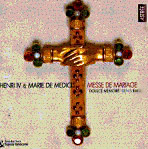Royal weddings have been major extravaganzas throughout history and the ceremonies often included excellent music composed especially for the occasion. On this recording Denis Raisin-Dadre and his ensemble Doulce Mémoire have successfully recreated such an event. The marriage of Henri IV of France to Maria de Médici in 1600 was by all accounts a grand spectacle, and if the music presented here is any indication, it must have been grand indeed. Raisin-Dadre has split the recording into two sections–the secular and the sacred–with an emphasis on the difference between the French and Italian styles. A variety of composers from both countries are featured, from the well known Claude Lejeune and Eustache du Caurroy to the relatively unknown Stefano Bernardi and Marco da Gagliano. All of the chosen works are terrific examples of court music of the period.
Raisin-Dadre and his musicians go to great lengths to insure the accuracy, not to mention the extraordinary beauty, of their performances. Special care is made in the enunciation of the text, especially in Lejeune’s tricky Te Deum, with historically accurate pronunciation that includes altering the rolled “r” on important words. The opening processional immediately sets the tone, and the musical testimonials to the happy couple by Du Caurroy (Henri’s maître de chapelle) with text mentioning specific contemporary events, makes quite an impression. The size of the ensembles, sometimes quite large, is based on historical evidence in documents left by the composers and eyewitnesses. Sackbutts, recorders of various sizes, viols, and reeds, all tuned to the very high A=464, sound glorious. The high tuning makes for an enhanced brightness, and the precision of the intonation is a treat to hear.
Gagliano’s Mass for Double Choir again shows the vocalists of Doulce Mémoire (what a cool name!) in top form, with the lead voices allowed to naturally rise above the harmony. The instrumental accompaniment is heaviest here, but the balance is near perfect, even in the interpolated Offertoire for eight voices by Gioseffo Guami. The full, detailed sound shows every measure and line in the best possible light, and the outstanding performances make this a must for all early music lovers and fans of choral music.
































